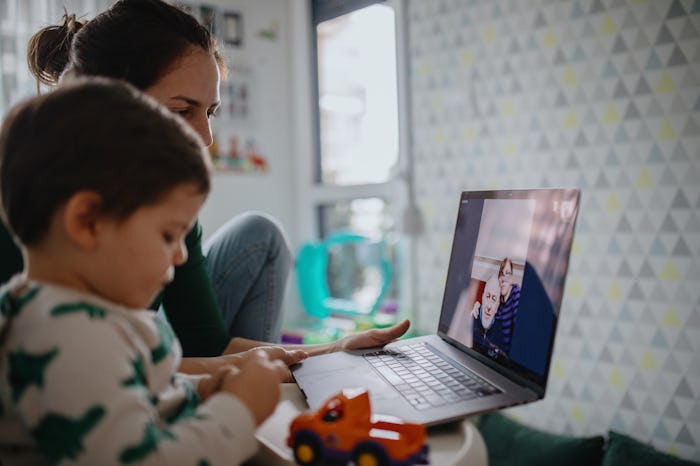News

How To Protect Your Zoom Outings From Hackers As FBI Warns Of "Zoom-Bombing"
As children across the country have turned to e-learning while schools are closed due to the ongoing coronavirus pandemic, playdates and classes have moved to virtual settings, like on Zoom. As more and more people are using the video conferencing system, however, concerns surrounding users' security have mounted, which has likely led to parents wondering how to make Zoom meetings private to protect their families' privacy and keep their children safe.
On March 30, the FBI issued a warning about the dangers of "Zoom-bombing," or having a conference call unexpectedly disrupted by disturbing images, inappropriate content, and threatening language from strangers. "The FBI has received multiple reports of conferences being disrupted by pornographic and/or hate images and threatening language," the warning read. One report the FBI received came from a high school class in Massachusetts that was disrupted by an individual shouting a profanity as well as the teacher's home address.
"We are deeply upset to hear about incidents involving this type of attack and we strongly condemn such behavior," a Zoom spokesperson tells Romper in an emailed statement. "Starting on March 20th, we have been actively educating users on how they can protect their meetings and help prevent incidents of harassment through features like waiting rooms, passwords, muting controls, and limiting screen sharing."
Below you'll find some steps you can take to ensure your Zoom meetings, classes, and playdates are free of unwanted guests:
- Make the meeting invite only and password protected. It's advised that people only email the link to the call to ensure that it stays between meeting attendees. Here's a detailed guide on how to set up a password.
- Enable the "Waiting Room" feature in settings. This requires the host of the meeting to approve every person on the call.
- Change screen sharing options to "Host Only" so the host is the only person who can share images or videos with attendees.
- Lock the call once everyone has joined. You can do this by clicking on "manage participants" at the bottom of the call, then clicking on the "more" button. From there, you can click on "lock meeting" to stop anyone else from entering.
- Remove unwanted participants in the chat by going to the "manage participants" hovering over the unwanted participant's name and clicking "remove".
- In the participants tab, hosts can also temporarily mute and stop all video in the chat.
- Disable the in-meeting chat to control what messages are being sent out between participants.
- Contact Zoom immediately if "Zoom Bombing" does occur.
If your child is simply attending the call, there are a few steps parents can still take:
- Make sure the host of the call is aware of Zoom's best safety practices ahead of time to ensure no unwanted guests make their way in. Many people are learning how to use Zoom for the first time, so sharing this information could come in handy.
- Be sure to not send the link to the call to anyone or post it on social media for others to see — this could bring in unwanted attendees.
- Only click on Zoom links from trusted people and emails, as ScreenRant explains, to avoid sharing information with strangers and falling for scams.
- Supervise your kid's call and help navigate the program if necessary.
Over 90,000 schools across 20 countries have now turned to Zoom for e-learning, according to a blog post written by Zoom's CEO, Eric S. Yuan. "We now have a much broader set of users who are utilizing our product in a myriad of unexpected ways, presenting us with challenges we did not anticipate when the platform was conceived," he wrote. Zoom is also now offering free training resources for people to learn use safety features in response to these challenges.
If you think you’re showing symptoms of coronavirus, which include fever, shortness of breath, and cough, call your doctor before going to get tested. If you’re anxious about the virus’s spread in your community, visit the CDC for up-to-date information and resources, or seek out mental health support. You can find all of Romper’s parents + coronavirus coverage here, and Bustle’s constantly updated, general “what to know about coronavirus” here.